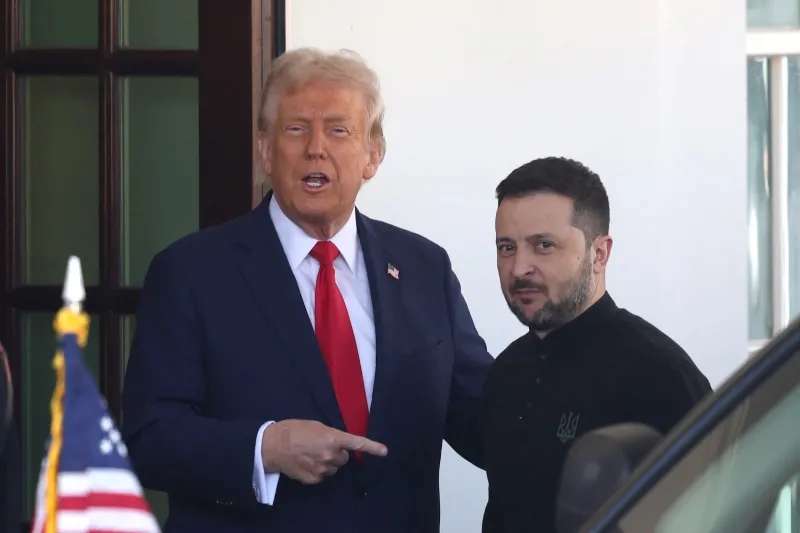Lessons from the Trump-Zelensky Confrontation

Lessons from the Trump-Zelensky Confrontation
World leaders must cater to Trump’s vanity to get what they need.
U.S. President Donald Trump greets Ukrainian President Volodymyr Zelensky as he arrives at the White House in Washington on Feb. 28. Tierney L. Cross/AFP via Getty Images
Not to be unkind or patronizing, but let’s face it: Most Americans don’t pay much attention to or care that much about foreign policy unless it impacts them directly, by, say, spiking the cost of eggs or oil—or triggering terrorist attacks.
The U.S. Constitution gives the commander in chief the lead in foreign policy. And since most Americans focus on what’s happening at home, presidents have extraordinary power and discretion to engage in foreign relations in ways they see fit.
Not to be unkind or patronizing, but let’s face it: Most Americans don’t pay much attention to or care that much about foreign policy unless it impacts them directly, by, say, spiking the cost of eggs or oil—or triggering terrorist attacks.
The U.S. Constitution gives the commander in chief the lead in foreign policy. And since most Americans focus on what’s happening at home, presidents have extraordinary power and discretion to engage in foreign relations in ways they see fit.
U.S. President Donald Trump understands this all too well. In his second term, he has weaponized foreign policy to build his reputation as a leader who can dictate terms to friends and foes alike and win in the process. Just look at his bravado about buying Greenland, taking over Gaza, and changing the name of the Gulf of Mexico to the Gulf of America. His tariff threats against Mexico, Canada, and China may bring short-term results, but it will be at an undetermined long-term cost to American consumers and businesses. For Trump, strutting the international stage, marketing his brand, and claiming victory are what really matters.
Nowhere was this clearer than in the recent horror show between Trump and Ukrainian President Volodymyr Zelensky, which took place in the Oval Office. With U.S. Vice President J.D. Vance luring Zelensky into what appeared to be a planned ambush, and with Zelensky taking the bait by pushing back against the false narrative of Russian President Vladimir Putin abiding by his agreements, failing to understand the trap, and deciding not to play the role of grateful aid recipient, Trump was able to enthrall his base with his bluster and the nonsensical focus on perceived disrespect for the “cherished” Oval Office.
For anyone watching with any reasonable conception of what constitutes the American national interest, that meeting represented the most serious threat to an idea that has underscored and driven U.S. foreign policy since World War II—that the United States stands with its allies in support of liberal, democratic values and in opposition to autocrats and naked aggression, in this case Russia’s unprovoked war to end Ukraine’s sovereignty. Trump went even further, and under the pretext of being a peacemaker to end the war, left the unmistakable impression that Russia wasn’t the obstacle to an agreement, but rather Zelensky. Trump and Vance’s bullying evinced support not only from Trump’s base but also from an almost completely subservient Republican Party leadership. Nothing reflected this better than Sen. Lindsey Graham extolling Zelensky’s leadership before the meeting and excoriating him afterward.
So what are the takeaways from that White House train wreck?
The first lesson is that Trump has no anchored conception of the U.S. national interest. Changing or altering U.S. policies as circumstances change is critically important for success. But this isn’t Trump’s way. Most of what he says and does is subordinated and tethered to his vanities, designed to buck up his image, boost his political and financial interests, or cultivate his pet projects, peeves, and festering grievances. With Trump, everything is personal. It’s been clear for years that Trump can’t stand Zelensky and has nothing but contempt, derision, and bad associations about Ukraine from his first impeachment. It should have been no surprise that Trump’s reaction to the recent meeting was that it would make great television. Indeed, Trump has no capacity to turn the “m” in me upside down to a “w” in we.
The second takeaway flows from the first and should be a lesson to the United States’ allies, friends, and partners who are unlucky enough to need things from the country and who must cross Trump’s path. French President Emmanuel Macron and British Prime Minister Keir Starmer delivered something of a master class in handling Trump. In their White House meetings, they played nice and all but prostrated themselves before Trump, catering to his outsized vanity and narcissism.
Macron flattered and held Trump’s hand. Starmer came bearing gifts in the form of an invite for Trump to meet King Charles III. Zelensky, in contrast, seems to have been badly counseled by his advisors. His English is not as good as he thinks it is, and his patience for nonsense was too short.
Trump pays attention to a few things—praise, obeisance, and perceived slights. Standing up to Trump may have been important to Zelensky’s own self-image and his domestic politics, especially given the fairy tales about Putin that Vance was spinning. But Zelensky failed to focus on the only objectives that needed to be achieved: get out of the meeting without a fight, have lunch, and sign the minerals agreement.
Looking ahead, a third issue is whether this disastrous meeting represented only a headline or a trend line. Just three days after the confrontation, Trump suspended military aid to Ukraine, including more than $1 billion in arms and ammunition already ordered. The question now is whether Congress will balk at the decision.
Equally and perhaps even more important is that Ukraine will be the odd man out as Trump plans his summit with Putin. Trump has three objectives in Ukraine—all tied to his conception of winning. The first is to end the fighting and be able to claim that he ended the war, even though he surely knows that cease-fires without iron-clad security provisions are made to be broken. Second, Trump seeks to shackle the Europeans with the responsibility for keeping and paying for the peace without any serious commitment from the United States. Third, Trump wants to normalize relations with Putin, whom he admires and respects as a fellow strongman. The minerals agreement with Ukraine is a bonus, though much of the rare-earth deposits are apparently in areas that Russia controls and others are unmapped.
Because Trump sees diplomacy as a series of short-term transactions where he can benefit, it just might be possible to salvage the train wreck. Indeed, now that Europe has indicated a willingness to increase its aid and involvement, Trump could decide that repairing ties with Zelensky will lead to the minerals agreement. He will argue that his brand of America First diplomacy finally got the Europeans to increase their share of responsibility for their own defense. If he and Vance call off the sycophantic attack dogs, it just might be possible to get things back on track.
The last depressing takeaway from the Trump-Zelensky meeting is that there’s not much anyone can do to change how this president operates abroad. Republicans are cowed and Democrats are on their back feet without much influence to compel Trump to change course.
The politically inconvenient reality is that there’s pretty strong bipartisan consensus on any number of foreign-policy issues, including China, Iran, and Israel, even if there are differences over tactics and approach. Indeed, most Americans—MAGA supporters and others—are not clamoring for foreign aid to be resumed. And there is a good deal of agreement that U.S. allies should do much more and stop free-riding.
For the United States’ allies, it is imperative to learn from the Trump-Zelensky meeting. Unsurprisingly, Israeli Prime Minister Benjamin Netanyahu, who knows a narcissist when he sees one, was quick to offer his thanks to the United States and to Trump personally for the assistance Israel has received. It’s tough to take but others may need to be equally deferential to the oversized ego of the U.S. president to get what they want. The best strategy may be to play the long game. Trump needs immediate gratification and cares little about the truth or long-term impacts. The long game requires focusing on what is critical and what can be salvaged, as well as playing into Trump’s personality needs.
Democrats also need to hunker down, as James Carville suggests, identify the areas where Trump’s policies are failing and unpopular, and create a Project 2026-2028 game plan of their own to fix what Trump has broken if they want to return to power.
And for Republicans, it is time for the senators and representatives to remember that they represent the American people in a co-equal branch of government—not simply a rubber stamp for a president who seems bent on sowing chaos and destruction of U.S. institutions. Saying no to the unqualified nominees for executive positions and to the destructive actions against government workers is the American thing to do.
This post is part of FP’s ongoing coverage of the Trump administration. Follow along here.
Daniel C. Kurtzer is a former U.S. ambassador to Egypt and Israel. He teaches diplomacy and conflict resolution at Princeton University’s School of Public and International Affairs.
Aaron David Miller is a senior fellow at the Carnegie Endowment for International Peace and a former U.S. State Department Middle East analyst and negotiator in Republican and Democratic administrations. He is the author of The End of Greatness: Why America Can’t Have (and Doesn’t Want) Another Great President. X: @aarondmiller2
More from Foreign Policy
-

Samuel Huntington holds his hand to his chin while sitting in an office. Samuel Huntington Is Getting His Revenge
The idea of a global “clash of civilizations” wasn’t wrong—it was just premature.
-

U.S. President Donald Trump meets with Ukrainian President Volodymyr Zelensky at the White House on Feb. 28. The Perils of a Reality TV Presidency
The Trump-Zelensky shouting match is a reminder that international diplomacy was never meant to be carried out in front of billions of eyes.
-

A Ukrainian serviceman trains in the woods near the frontline in Ukraine. Three Years On, What’s Next for Europe and Ukraine?
Nine thinkers on the bombshells coming out of Washington.
-

Donald Trump is seen inside a helicopter at night looking down at a cell phone Trump’s New Map
America’s first post-literate president has only geography to fall back on.








Join the Conversation
Commenting on this and other recent articles is just one benefit of a Foreign Policy subscription.
Already a subscriber?
.
Subscribe
Subscribe
View Comments
Join the Conversation
Join the conversation on this and other recent Foreign Policy articles when you subscribe now.
Subscribe
Subscribe
Not your account?
View Comments
Join the Conversation
Please follow our comment guidelines, stay on topic, and be civil, courteous, and respectful of others’ beliefs.
Change your username |
Log out
Change your username:
CANCEL
Confirm your username to get started.
The default username below has been generated using the first name and last initial on your FP subscriber account. Usernames may be updated at any time and must not contain inappropriate or offensive language.